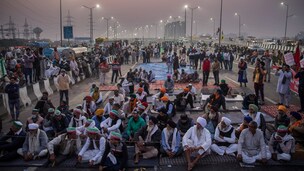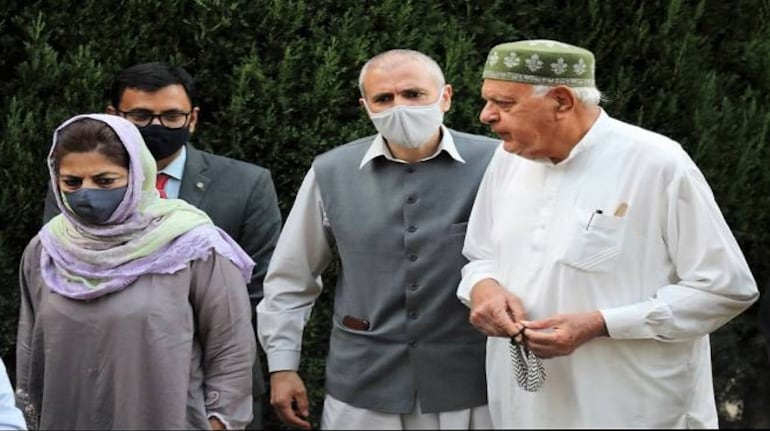Former Chief Ministers of Jammu and Kashmir, Mehbooba Mufti, Omar Abdullah, and Farooq Abdullah (File Photo).
The People's Alliance for Gupkar Declaration (PAGD) is set to emerge as the largest political entity bagging over a 110 of the 280 seats in the first-ever District Development Council (DDC) polls in Jammu and Kashmir, the counting of which was underway for the second day on December 23.
The Bharatiya Janata Party (BJP) is likely to emerge as the single-largest party as the final numbers were awaited.
The PAGD, an alliance of seven regional parties, is on course to win the majority of the seats in the Kashmir division, while the BJP had an upper hand in the Jammu region, the wins and the leads out so far indicated.
The Jammu and Kashmir state election authority has so far announced the results for 276 of the 280 seats that went to polls . The PAGD has won 110 while the BJP has bagged 74 of them. Party wise in PAGD, the NC has won 67 seats, the PDP 27, JKPC 8 and CPIM 5. The independents have won 49 and the Congress 26 seats, among others. The Centre-backed JK Apni Party has won 12 seats so far, according to the authority. The counting for two seats has been put on hold because of a row over the nationality of one candidate in each seat.
The election was seen as a fight between the BJP and other political parties in Jammu and Kashmir.
The mainstream political parties in the union territory, including the Jammu and Kashmir Peoples Democratic Party (PDP), the National Conference (NC), the Jammu and Kashmir People's Conference (PC), and the Awami National Conference (ANC) contested the polls as part of the alliance making it a tough fight for the BJP.
For the saffron party, the DDC election was a litmus test, and a referendum on scrapping of Article 370 last year. The party has not been in power in the state, except for a term when it had an alliance with Mufti Mohammad Sayeed’s PDP in 2015. In June 2018, the BJP pulled out of its coalition government with the PDP.
The results, analysts said, also showed the relevance of the mainstream regional parties in the PAGD - a united front against the BJP to collectively fight for the restoration of Article 370.
READ: Explained | All you need to know about the first-ever DDC polls in Jammu and Kashmir
The highlight of the results, however, was that the BJP won three seats in Kashmir division, including one in the summer capital Srinagar. The three wins are the BJP's first-ever victory in an election from any seat in Kashmir division while facing regional heavyweights like the NC and the PDP.
Overall, while the PAGD has already won 9 of the 20 district councils. The BJP has won six district councils of Jammu division, according to reports. Both Jammu and Kashmir divisions have ten districts each that went to polls. Each district has 14 seats.
In Jammu, the BJP is set to win more than 70 of the 140 seats while the Gupkar alliance is winning more than 35. In Kashmir, the regional alliance is winning 75 seats.
The PAGD alliance claimed on December 22 that they had the support of people and the results were a referendum against the revocation of Article 370. The BJP, which may finish as the single-largest party, was jubilant over its performance in Jammu division and winning three seats in Kashmir.
"The verdict means a lot to us. It means more to us than what I can put into words. I think it should also mean something to the BJP," former J&K CM and NC leader Omar Abdullah told NDTV.
The eight-phase polls for the 280 constituencies across 20 districts assumed significance as it was the first electoral exercise carried out in Jammu and Kashmir since the abrogation of Article 370 in August last year.
The Congress which had among the initial signatories of the Gupkar Declaration contested separately.
While most of the leaders of the parties in Gupkar Alliance stayed away from the campaign, the BJP drafted its top leaders including Union ministers Mukhtar Abbas Naqvi, Anurag Thakur, Jitendra Singh, Smriti Irani, and Krishan Pal Gujrar campaigning for the party’s candidates.
The UT administration said the polls are aimed at reviving the Panchayati Raj system in Jammu and Kashmir. On October 17, the Centre had amended the Jammu and Kashmir Panchayati Raj Act, 1989, to facilitate the setting up of these councils. The UT administration also amended the J&K Panchayati Raj Rules, 1996, to pave way for the establishment of the elected DDCs.
Among the 2,178 candidates, including 450 women, in the fray, the BJP had fielded 183 candidates, highest in the contest by a single party. The NC, PDP, PC, CPIM, and the JKPM who fought together in the alliance fielded over 220 candidates. The Congress, had fielded 118 candidates in the contest.
In the PAGD, the NC had fielded 132 candidates, while the PDP fielded 63 candidates. People’s Conference had 11 candidates in the fray, while the CPIM had seven candidates in the fray.
The newly formed J&K Apni Party had fielded 134 candidates. There were over 1,000 independents contesting for a place in the DDCs.
The J&K Assembly was dissolved in 2018, five months after the BJP withdrew support to the Mehbooba Mufti government in the erstwhile state.










_2020091018165303jzv.jpg)


























